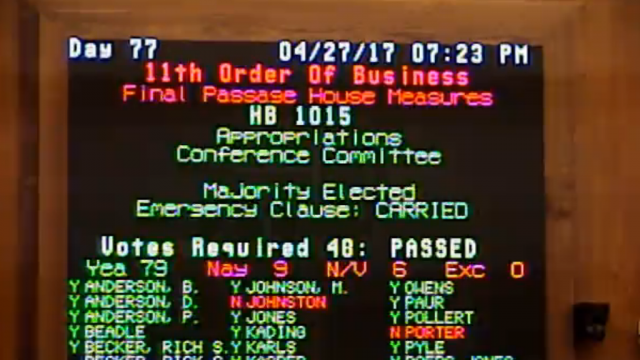Legislators End Session, State General Fund Spending Down More Than 38 Percent From Oil Boom Peak

The legislative session in Bismarck finally ended today with lawmakers voting to adjourn sine die this evening.
Here’s video:
#SineDie #NDLeg pic.twitter.com/EmsntIRh9p
— ND House Republicans (@NDHouseGOP) April 28, 2017
You can read Governor Doug Burgum’s spin on the outcomes from the session below.
“Despite the unprecedented revenue shortfall we faced heading into this session, we were able to fund our priorities and balance the budget through sensible cuts, limited use of reserves and new initiatives that will streamline state government and make it more responsive to taxpayers,” he says in his statement. “Over the next 20 months, our administration will work tirelessly to carry out this budget and identify ways to reinvent government and improve services to the citizens of North Dakota.”
The final general fund budget number is $4.3 billion for the biennium. To put that in context, here’s the trend line for state general fund spending going back to the 1995-1997 session. What you’re looking at is a more than 38 percent decline in general fund spending:
Don’t ever let anyone tell you that the oil boom didn’t result in a spending bubble. As you can see, it did, and while that reality is regrettable the prudent approach to addressing it in the 2017 session was a spending correction.
Per Burgum’s numbers the final total spending figure (that’s the general fund plus special funds plus federal dollars) for the coming biennium is $13.6 billion. Which, honestly, isn’t all that much of a decrease as this chart shows. The previous biennium’s number was $14.2 million:
There are some things coming out of this session which will hurt Republicans.
The perception of fiscal mismanagement is going to be a problem for them, though Republicans can argue that the state had plenty of reserves to get through this rough patch, and that Democrats probably wouldn’t have handled it any better.
Property taxes are also going to be a problem, as I’ve been harping on in recent weeks. “Senate Bill 2206 transfers the funding responsibility for social services from counties to the state during a two-year pilot program, creating $161 million in permanent property tax relief while repealing the unsustainable 12 percent state-paid property tax buydown program,” Burgum’s release states. I’m glad Burgum opposed the buy downs, and that lawmakers did away with them, but as the release notes the takeover of social services is worth about $161 million in the current biennium. The property tax buy down was worth about $270 million.
That’s a roughly $110 million gap between those two policies, and starting in 2018 (election year!) it’s probably going to show up on tax statements.
I expect that Democrats are probably going to be able to ride these issues into some victories in the legislative races next year. Not enough to get a majority in either chamber, mind you, but enough to come back for the 2019 session with a larger minority.
Here’s Burgum’s full statement:
[scribd id=346615710 key=key-ra5fhfeWKiEK2DZr4XV7 mode=scroll]






